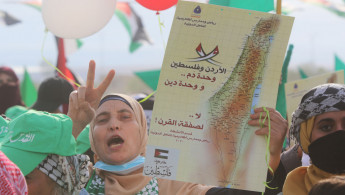Dozens of Jordanians arrested after protesting Israeli solar power project
At least 36 Jordanians were arrested this week for publicly protesting a planned solar power project with Israel, amid condemnation from human rights activists.
On Monday and Tuesday, demonstrators across Jordan protested the announcement of a joint Jordanian-Israeli-UAE solar power project. Chanting against what they termed “normalisation” with Israel, attendees demanded the Jordanian government cancel the proposed deal.
The project, announced on Monday with US Climate Envoy John Kerry in attendance, would see the UAE build a 600 MW solar farm in the south of Jordan. The resulting energy would be supplied to Israel, which would give Jordan 200 million cubic meters of desalinated water in return. Jordan, the second-most water scarce country in the world, desperately needs the water.
In response to the demonstrations, Jordanian authorities arrested participants and banned further demonstrations from taking place.
Most of the protesters detained were university students – the youngest of them just 18 years old. Though they remain in detention, none of the protesters have yet to be charged with a specific crime.
“They were administratively detained by a decision of the provincial governor without having charges brought against them – which is against the law,” Hala Ahed, a human rights lawyer working with the National Forum for Defending Freedoms, told The New Arab.
“Usually governors rely on the Crime Prevention Law to justify administrative detention in specific cases, such as if someone constitutes a danger or there is a suspicion that they will commit a crime. But these justifications do not apply to the detainees,” Ahed said.
Instances of public protests are rare in Jordan and are often met with a harsh security response. After the government shuttered the Teachers’ Syndicate in July 2020, about 1,000 demonstrators were arrested for protesting the decision.
In response to the government’s crackdown on the Teachers’ Syndicate, global rights monitor Freedom House downgraded Jordan from “Partly Free” to “Not Free.”
There are some protests that are generally tolerated, however, especially those relating to Palestine. Demonstrations against the proposed “Deal of the Century” and the US decision to move the US Embassy to Jerusalem in 2018 were allowed to occur mostly unhindered.
Noting that the Jordanian constitution guarantees both freedom of expression and assembly, Ahed said that the climate in Jordan has become hostile to political expression.
“Restrictions on freedom of expression and assembly confirm that there is a policy and pattern of restricting freedoms and preventing any manifestation of opposition,” she said.
Some of the detainees were initially given a choice to be released on bail, with some of the protesters’ bails set as high as 500,000 JOD (US$705,000). One protester who was given a 500,000 JOD bail works selling goods on the side of the road, making his ability to pay unlikely, Ahed said.
Despite the high price, some families decided to pay bail anyway. Upon arriving at the detention center, however, they were told that the decision to release their children was rescinded until further notice.
Basel Ahmad, a representative of the Arab Renewal Bloc at the Hashemite University who participated in the protests, expressed disappointment at his peers’ detention.
“As a student in the prime of my life, I feel that any attempt or future ambition on my part to change my country or make it better will be fought by state agencies. This is reflected by the youth today, as most are dreaming of emigrating,” the 21-year old told The New Arab.





 Follow the Middle East's top stories in English at The New Arab on Google News
Follow the Middle East's top stories in English at The New Arab on Google News
![The UAE is widely suspected of arming the RSF militia [Getty]](/sites/default/files/styles/image_330x185/public/2024-11/GettyImages-472529908.jpg?h=69f2b9d0&itok=Yauw3YTG)
![Netanyahu furiously denounced the ICC [Getty]](/sites/default/files/styles/image_330x185/public/2024-11/GettyImages-2169352575.jpg?h=199d8c1f&itok=-vRiruf5)
![Both Hamas and the Palestinian Authority welcomed the ICC arrest warrants [Getty]](/sites/default/files/styles/image_330x185/public/2024-11/GettyImages-2178351173.jpg?h=199d8c1f&itok=TV858iVg)